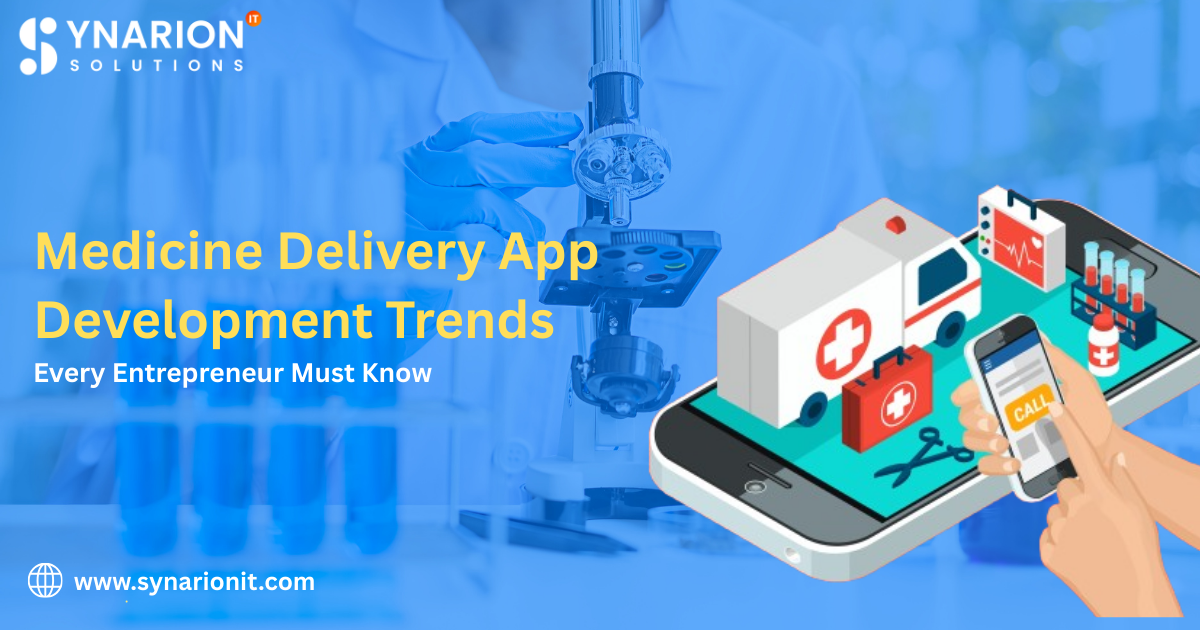The healthcare industry has seen a massive digital transformation over the past few years, and one of the fastest-growing innovations is medicine delivery apps. With the rise of e-pharmacies, on-demand services, and telemedicine platforms, customers no longer need to visit physical stores for prescriptions. Instead, they can order medicines online with just a few clicks and have them delivered right to their doorstep.
For businesses and startups looking to invest in this sector, staying updated with the latest medicine delivery app development trends is essential. A reliable Medicine Delivery App Development Company can help you leverage these trends and build apps that meet user expectations while ensuring regulatory compliance.
In this blog, we’ll explore the top trends shaping medicine delivery app development in 2025 and beyond.
1. AI-Powered Personalized Recommendations
Artificial Intelligence is playing a huge role in improving user experience across industries, and medicine delivery is no exception. AI can:
- Suggest medicines based on purchase history
- Provide reminders for refills
- Recommend healthier alternatives
Entrepreneurs who adopt AI-driven personalization can build apps that feel more like digital health companions rather than just delivery platforms.
2. Integration with Telemedicine Services
Modern users want more than just medicine delivery — they also seek medical consultations. Integrating telemedicine into your app allows customers to:
- Book virtual doctor appointments
- Get prescriptions directly within the app
- Instantly order prescribed medicines
3. Blockchain for Data Security and Transparency
With sensitive medical information involved, data privacy is a top concern. Blockchain technology is being adopted to:
- Secure medical and prescription records
- Ensure authenticity of medicines
- Build trust between pharmacies and patients
By incorporating blockchain, entrepreneurs can address one of the biggest challenges in online medicine delivery—counterfeit products and data leaks.
4. Real-Time Tracking and Smart Logistics
Today’s users expect transparency in delivery services. Real-time tracking powered by GPS allows customers to:
- Track their orders live
- Receive estimated delivery times
- Get updates on delivery status
For pharmacies, smart logistics powered by AI ensures optimized routes, reducing delays and enhancing customer satisfaction.
5. Subscription-Based Models
A growing trend in medicine delivery is subscription-based services, particularly for patients with chronic conditions who need regular refills. Apps now provide:
- Monthly medicine subscription plans
- Automated doorstep deliveries
- Discounts for loyal customers
This not only builds customer retention but also ensures recurring revenue for businesses.
6. Multi-Language & Regional Support
With medicine delivery apps reaching rural and semi-urban areas, multi-language support is becoming essential. A localized approach can help entrepreneurs:
- Cater to non-English-speaking audiences
- Build trust in diverse markets
- Expand reach across regions
7. AR & VR for Better User Experience
Augmented Reality (AR) and Virtual Reality (VR) are emerging as innovative tools in healthcare apps. They can:
- Help customers understand dosage instructions visually
- Provide virtual tours of pharmacy stores
- Offer interactive health education
Although still new, this trend has the potential to revolutionize user engagement.
8. Integration with Wearables and IoT
Smart devices and wearables are increasingly being integrated into healthcare apps. By syncing medicine delivery apps with IoT devices, patients can:
- Get dosage reminders on smartwatches
- Track health data and medication schedules
- Share health reports directly with doctors
This creates a connected healthcare ecosystem that improves patient outcomes.
9. Focus on Regulatory Compliance
One of the biggest challenges in medicine delivery is adhering to healthcare regulations. A professional Medicine Delivery App Development Company ensures your app complies with:
- Local pharmacy laws
- E-prescription standards
- Data privacy regulations like HIPAA or GDPR
Compliance builds credibility and prevents legal complications for your business.
10. AI-Powered Chatbots for Customer Support
Round-the-clock assistance is crucial in healthcare. AI chatbots are being widely adopted to:
- Answer medicine-related queries
- Guide users through app navigation
- Provide instant order updates
This reduces dependency on human support staff while ensuring timely assistance.
Final Thoughts
The demand for medicine delivery apps is only going to rise in the coming years, driven by convenience, technology, and evolving healthcare needs. Entrepreneurs who stay ahead of these trends can establish a strong position in the digital healthcare market.
To succeed, partnering with an experienced Medicine Delivery App Development Company is the smartest move. With expertise in cutting-edge technologies, compliance, and user-centric design, they can help you build a future-ready app that not only meets market demands but also improves patient care.


